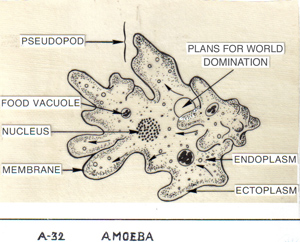
Earth: Where Wonders Never Cease. A study of three slime molds by the amazing Kim Fleming, photographer of this blog's masthead. Used with permission. http://www.flickr.com/photos/myriorama/ / CC BY-NC-SA 2.0
If you’re a reader of this blog, you’re probably like me: you love life on Earth. If you’re still struggling for a gift for someone and know they feel the same, consider a donation in their name to a conservation organization. The Nature Conservancy or the relatively new charity Oceana are two large conservation organizations with high Charity Navigator ratings.
We all know these sorts of places market themselves with photos of polar bears and whales, but the fact is that preserving land and sea for these charismatic megafauna (and this is the reason they use this term — because the public likes and tends to relate to them) also protects our charismatic microfauna — slime molds, sea cucumbers, ciliates, etc. — and the organizers of these charities know this and use them thusly. That’s fine with me if people need cute and cuddly in order to justify saving something, but as you know, the raison d’etre of this blog is to show you why the weird and wonderful provide every bit as much reason, if not more.
If you don’t have any more gifts to buy, consider making a gift of your own this holiday season to one of these two charities or the conservation organization of your choice — there are many. There are other low-cost, free, or money-saving ways you can help the crazy creatures of the planet in the coming year, too, and I here suggest only a few: conserve the resources you use; lower your carbon footprint; volunteer for a citizen science project (like a backyard bird count or bioblitz); eat less meat (chopping down the rainforest to grow soybeans for animal feed is a major cause of rainforest loss, and my slime mold buddies love to hang out in rainforest. Cows make lots of greenhouse gases too); use a Seafood Watch wallet card to make good choices when you do buy seafood in restaurants or markets; have fewer children (notice I’m not saying have *no* children, although that’s perfectly fine for those so-inclined. However, I do believe humans are very much part of the weird wonderfulness of the planet and that having a few children (and teaching them about life!) is a good thing for those so-inclined); buy less new stuff; take a child (or a friend!) to an aquarium or zoo; and talk to other people about amazing, celebrity-shy creatures of the planet in a non-obnoxious, engaging way. In my opinion, the carrot is a much more effective way to influence behavior than the guilt-trip-based stick.
I’m going out of town in a few days and will be out of web contact for about a week or so. I wish you all a joyous holiday season!


{ 2 comments… read them below or add one }
Happy holidays! A few links of seasonal and/or dietary relevance:
I foundAn Organismal Christmas from a saved Google News search for parasite. This student project was covered here. The saved news searches (as RSS feeds in any reader, though I use it on my iGoogle homepage) have me reading lots of small town stories I might miss otherwise.
I also really appreciated this piece at the nytimes.com on the topic of ethical eating: Sorry, Vegans: Brussels Sprouts Like to Live, Too. The author left out the fact that often plant seeds need to be eaten in order to germinate. There are analogies I think to raising hens for their eggs or dairy cows for their milk or honey bees for their honey to pick just three obvious ones. If they are treated humanely and not all the resources are taken, it is hard to see the problem with this practice. I also like the discussion of food and ethics in A Language Older Than Words.
That saved search netted a couple other interesting reads about mistletoe that are worth posting today:
From parasite to pucker-power
Mistletoe: Parasite with pagan roots
The real definition of charismatic is pretty subjective and that’s a problem when it comes to justifications. One of my favorite blogs for finding new photos of beautiful animals is paradoxically called Ugly Overload (warning: the ads for pest control are depressing and remind you that much of humanity considers itself at war with nature to varying degrees).
You’re probably familiar with this quote…
I can forgive his anthropocentric views today. That was the better argument for his time (and perhaps ours too) for preservation.
Whoops, the “blockquote cite” didn’t work as I thought it would. That quote is by Ralph Waldo Emerson.